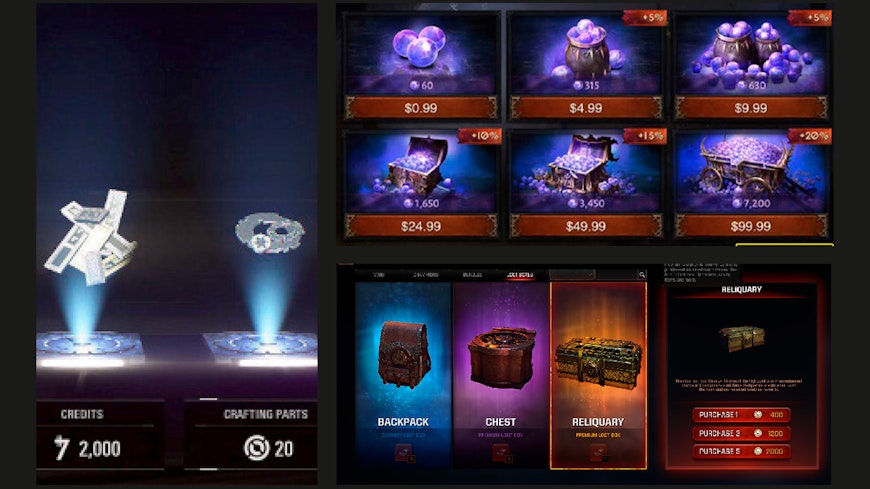
By Nick Gelling
Product Test Journalist | Kaipūrongo Whakamātautau Hautaonga
Blizzard Entertainment’s latest game, Diablo Immortal, was released in June in nearly every country in the world. Two notable exceptions were Belgium and the Netherlands – whose governments have ruled that paid, random rewards in games qualify as illegal gambling.
In Diablo, a player’s strength depends on extremely rare gems. The only feasible way to get the best gems is to spend real money on ‘legendary crests’, which cost about $4.50 each and improve your chances. However, on average, you’d still have to use 2000 crests to get a single gem of the best kind. Gems acquired in this way can also be traded or sold to other players.

A short history of random rewards
Chance-based spending in video games was normalised through the 2010s, going by many euphemisms. For example, ‘gacha’ is a genre of game popular in Japan and increasingly in China and Korea. Gacha games are modelled after ‘gashapon’ – Japanese toys dispensed at random from vending machines – and are built almost entirely around gambling-like mechanics.
Outside of gacha, each game has a different name for its randomised rewards but ‘loot box’ has become the standard descriptor. The key feature is that the player doesn’t know what they’re buying.
While these systems were never particularly popular outside Asia, the industry faced a backlash in 2017 when several full-priced titles, such as Star Wars Battlefront II, implemented aggressive loot box strategies. Loot boxes have since faced regulatory action in several countries and become broadly unpopular among players.
Yet they persist, especially in mobile games. Diablo Immortal highlights how central the monetisation strategy still is in the free-to-play market. Instead of making the game work without crests or the super-rare gems, Blizzard decided to skip the Belgian and Dutch markets altogether.
The natural evolution of free-to-play games
A game isn’t cheap to create and if it’s free to download, the creator needs to make its budget back somehow.
Under the ‘freemium’ model, games have no barrier to access but lock premium content behind transactions within the game. Most of the biggest games in the industry follow this model.
According to Chris Wilson, managing director of Grinding Gear Games, that means 90% of players don’t spend a cent – and 1% spend a whole lot.
“Ideally, the big spender will have a really fulfilling experience and that will enable more people to enjoy the game for free.”
Relying on big spenders to subsidise the majority of players is a pillar of freemium gaming, and something it has in common with gambling. In the UK, it’s estimated that 60% of the gambling industry’s profits come from the 5% of players who are problem gamblers.
Grinding Gear’s Path of Exile is one of the most successful games to come from New Zealand. It’s free to play and makes money from players buying cosmetic items with no gameplay effect.
“We do sell mystery boxes that have random outcomes,” Wilson said. “The items that can be obtained do not have gameplay consequences – they’re just dress-up stuff. A month after the box goes off sale, the items are added to the regular store for standalone purchasing.”
So why add randomness into the mix in the first place?
“Mystery boxes let us offer some microtransactions to our players at a lower price point than normal,” said Wilson. “They don’t know exactly what they’re going to get but we disclose the odds of each outcome, and the price is a fraction of a regular purchase.”
While some loot box systems spit out the same common items again and again, Path of Exile players can only receive each item once, which limits how many boxes can be bought.
Wilson said it would be “totally unacceptable” to include items with gameplay effects in Path of Exile’s loot boxes.
“A fair playing field is really important in online games.”
Free-to-play gaming is a massive growth industry, capturing about $100 billion in revenue per year. There are companies making immense profits from randomised rewards in ‘free’ games.
As it continues to dominate the gaming landscape, Wilson sees the model pulling in two contradictory directions.
“Some games get more predatory to maximise revenue, and others become more ethical over time,” he said. “We’re trying very hard to push the industry along the latter path.”
Pay-to-play games can have loot boxes too

Loot boxes take different forms from game to game, but most are bought using an in-game currency that costs real money.
Jealously eyeing the enormous revenues in the free-to-play sector, studios have tried their luck implementing similar strategies in traditional gaming products.
As the game industry has expanded and pushed technological limits, budgets for high-profile projects have ballooned to rival those of blockbuster Hollywood films. Meanwhile, the shelf price of a premium retail game has grown at a much slower rate. Game publishers argue they have to pay for development through other means.
Electronic Arts (EA) is perhaps the publisher that’s had the most success with loot boxes in premium games, through its various EA Sports franchises. In particular, its annual FIFA football simulation titles have increasingly focused on a game mode called Ultimate Team, which boils down to a collectible card game. Players buy ’packs’ containing footballers to add to their team and can trade them with other players.
In 2021, EA backed down on some of the randomness in Ultimate Team mode after pressure from governments and advocacy groups. FIFA now features special ‘preview’ packs that players can peek at before purchase, once a day. EA received $1.62 billion in revenue from Ultimate Team in the 2020-2021 financial year.
Why does it work?
Dr Aaron Drummond, senior lecturer in psychology at Massey University, said rewarding a behaviour occasionally is more effective at increasing the behaviour than rewarding it every time.
“This is because the person feels like each time they repeat the behaviour, they are slightly closer to being rewarded – and the next time they might get a win. This is the underlying structural characteristic of loot boxes, similar to the characteristics in conventional gambling.”
But they’re not just similar behaviours – they’re also more likely to occur together. A meta-analysis run by one of Dr Drummond’s students shows a robust association between problem gambling and loot box purchasing across 16,000 participants.
“Evidence emerging from our lab is suggesting that it is more likely that having problem gambling symptoms makes users vulnerable to spending more on loot boxes rather than the other way around, but more work is needed to confirm this,” Dr Drummond said.
Opening a box is an exhilarating affair, featuring flashing colours and stimulating sound effects – some of the same techniques pokie machines use to reinforce spending. Dr Drummond said this is an important area to research further.
Some academics believe addiction is a wider problem in gaming, especially with many modern games designed for daily play over months or even years.
“Irrespective of where one falls on that debate, I think it is fair to say that like many activities, some people do game to excess,” said Dr Drummond. “We have found that individuals with higher levels of excessive gaming tend to also spend more on loot boxes.”
Regulation at home and abroad
In May, the Norwegian Consumer Council (NCC) published a report into loot boxes in games. It called the practice “predatory, manipulative and exceedingly aggressive”, focusing on two popular titles, FIFA and Raid: Shadow Legends (a free-to-play gacha game). The report was also supported by organisations representing consumers in 18 other European countries.
Off the back of the NCC’s work, 15 advocacy groups co-signed an open letter to the US Federal Trade Commission. The letter asked it to investigate whether EA’s loot box sales count as “unfair and deceptive practices” in violation of US consumer law. The letter focused on Ultimate Team mode and the exploitation of children and teens for profit.
Te Tari Taiwhenua, Department of Internal Affairs (DIA) is responsible for regulating gambling on our shores and said it is following with interest the regulatory developments in other jurisdictions.
A spokesperson for DIA said that while loot boxes can contain gambling-like features, they are not considered gambling in New Zealand.
“This is because players do not purchase loot boxes seeking to win money or something that can be converted into money. The main reason for purchase is to advance in a game.”
Andree Froude of the Problem Gambling Foundation said jurisdictions around the world are grappling with this.
“The Government does not consider that loot boxes fit the technical definition of gambling,” she said. “Regardless, we need effective measures, including age restrictions and stronger regulations on gaming industry products, particularly to protect young gamers.”
Froude doesn’t believe the heavy-handed Belgian or Dutch approach is appropriate.
“Banning or prohibition isn’t the answer,” she said. “What we do need is strong consumer protection measures, and to raise awareness of the risks associated with loot boxes so parents and gamers understand them.”
It’s not just the games themselves
The general culture surrounding modern video gaming can also encourage gambling habits.
Twitch, the game industry’s largest live-streaming platform, features a Slots category – with more than a million followers – for watching popular streamers play digital pokie machines. These streams are often sponsored by casinos. Twitch, which is owned by Amazon, also peppers streams from popular figures with video ads for gambling sites and apps.
“Importantly, these ads are targeted towards younger people,” said Andree Froude of the Problem Gambling Foundation. “Early exposure to such advertisements may desensitise people to these games and consequently, normalise gambling behaviour.”
Gambling on the results of games
In the 2020-2021 financial year, New Zealand gamblers lost $385 million to the TAB from betting on sports, from horse racing through to table tennis. But as well as betting on real-world football on the TAB’s website, you can now also bet on a game of FIFA between two professional players controlling football teams.

As competitive gaming, or ‘e-sports’, has grown into a lucrative industry, so too has mainstream acceptance of betting on results. However, while the TAB is regulated and must redistribute some of its profits to the community, e-sports gambling is often run through alternative sites as well – some of which are completely unlicensed.
While JD was studying in 2015, he would spend 20 hours a week gambling on e-sports results.
“I spent, you know, 10 hours-plus at university every day. And then I’d wake up in the middle of the night to watch games taking place in Europe or America.”
JD participated in skin betting, where punters win and lose in-game items rather than real money. The ‘skins’ themselves come from paid loot boxes and have different values depending on their relative rarity.
Counter-Strike: Global Offensive, published by Valve Corporation, was JD’s game of choice. While Valve didn’t exactly sanction skin betting, JD said there was tacit approval of the practice at the time.
“They certainly didn’t explicitly stamp it out, which they could have done. It was all pretty much a grey area.”
JD was a casual Counter-Strike player but quickly became interested in the competitive scene.
“I began to realise that, compared to regular sports betting, it wasn’t as much of a solved problem. There were a lot of people with a lot less information.”
He recalls that the first time he bought some skins, they quickly disappeared.
“There was a bit of a false start. I started with about US$50 worth of skins and at that stage, I was fairly naive and ended up without much left,” he said. “At that point, I thought I’d give it one more go. I bought in again with the same amount, and that time I was successful.”
Looking back, JD thinks he was likely betting against children.
“I would see odds on games that absolutely blew my mind why people were making these calls,” he said.
“I’d be very surprised if the majority of those bets were placed by people of the legal age to be gambling. There was no age control. It’s very easy to have access to a debit card and have the skins available. You don’t have to be of gambling age to do that.”
By the time JD stopped betting, he’d amassed skins worth US$600. He kept some and sold the rest for Bitcoin.
He doesn’t feel guilty for participating: “If it wasn't me taking that money, I know there were plenty of other people raking it in by the thousands.”
Valve took a stance against skin gambling in its games and on its Steam platform in late 2016, after it was targeted with multiple lawsuits for aiding underaged gambling. While the practice persists, in Counter-Strike as well as other games, it has died down and now sits predominantly in the black market.
JD isn’t upset that skin betting was cracked down on.
“When I was doing it, I knew it was never going to last, and I think it’s a good thing that it didn’t,” he explained.
“It didn’t protect people who were vulnerable to becoming addicted to gambling. It didn’t protect minors.”
He also thinks game developers should bear responsibility for predatory third-party markets that sprout up around loot boxes.
“At the end of the day, it’s really simple: loot box systems are gambling. It’s just an extension of their gambling system to an open marketplace, and it’s a natural progression.
“If you make tradable assets that are only accessible through loot boxes, then of course you’re going to end up with people using those as tokens for further gambling. I mean, I don’t know what they expected.”

Subscribe to our newsletters
Get even more Consumer NZ news and invitations to share your voice on important issues straight to your inbox. You don’t have to be a member to have these newsletters emailed to you regularly.


